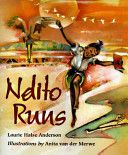
Every day many children in Kenya run miles to school–so does Ndito. From her village in the highlands she runs barefoot, across ridges and down hills, under baobab trees and through tall grass
Materials from Kenya

Every day many children in Kenya run miles to school–so does Ndito. From her village in the highlands she runs barefoot, across ridges and down hills, under baobab trees and through tall grass
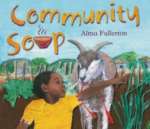
In a garden outside a Kenyan schoolhouse, children are working together to harvest the vegetables they have grown and make them into a soup for everyone to share. But Kioni is having trouble: her herd of mischievous goats followed her to school today and they are trying to eat all the vegetables. The ensuing chaos caused by the goats is cleverly resolved by the children, making their vegetable soup very tasty while saving Kioni’s four-legged intruders at the same time.
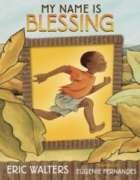
Based on a true story about a young Kenyan boy whose mother left him but had named him Muthini which meant suffering because he was born with no fingers on his left hand and only two on his right. Many times he was made fun of or avoided which hurt him deeply. He lives with his very elderly grandmother, his Nyanya, along with many cousins whose parents had either died or left them. They are extremely poor and there is never enough money or food, but plenty of love. A difficult choice must be made and Muthini is the youngest child and needs to have a better chance in life, so his Nyanya takes him to an orphanage where he is blessed and his name is changed to Baraka which means blessing for he was a blessing just as his grandmother always knew.
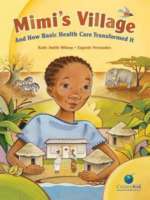
In this newest addition to the CitizenKidTM collection of inspiring stories from around the globe, Mimi Malaho and her family help bring basic health care to their community. By making small changes like sleeping under mosquito nets and big ones like building a clinic with outside help, the Malahos and their neighbors transform their Kenyan village from one afraid of illness to a thriving community. “A great resource for introducing children to the issues surrounding global health and empowering them to get involved.” — Ophelia Dahl, Executive Director, Partners In Health
This book has been included in WOW’s Kids Taking Action Booklist. For our current list, visit our Boolist page under Resources in the green navigation bar.
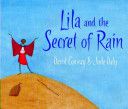
For months, the sun has baked Lila’s Kenyan village. It’s too hot to gather firewood, too hot to weed the garden, even too hot to milk the cow. Without rain, the crops will fail. Lila is so worried that when her grandfather whispers to her the secret of making the rain fall, she decides to do something about it — even if it means confronting the sky itself. Lila’s quest to save the village is beautifully told in David Conway’s elegant, sparse prose. Jude Daly’s color-drenched illustrations perfectly evoke both the parched landscape and vibrant village life.
 Gathered from 7 of the more than 40 ethnic groups of Kenya, these stores are brought to you both as original translations and as lively, ready-to-use retellings. Ethnic groups respresented are the Kikuyu, Turkana, Akamba, Kipsigis, Taita, Luhya, and Samburu. Cultural and historical background information on the groups, notes on the stories, lists of further resources, and tips for retelling make this collection useful to librarians, storytellers, public speakers, teachers, and parents. The fascinating account of McNeils’s own experiences and observations in collecting the tales is woven throughout the book. Beautiful color photos of Kenyan storytellers and the animals portrayed in the stories illustrate her journey and the tales.
Gathered from 7 of the more than 40 ethnic groups of Kenya, these stores are brought to you both as original translations and as lively, ready-to-use retellings. Ethnic groups respresented are the Kikuyu, Turkana, Akamba, Kipsigis, Taita, Luhya, and Samburu. Cultural and historical background information on the groups, notes on the stories, lists of further resources, and tips for retelling make this collection useful to librarians, storytellers, public speakers, teachers, and parents. The fascinating account of McNeils’s own experiences and observations in collecting the tales is woven throughout the book. Beautiful color photos of Kenyan storytellers and the animals portrayed in the stories illustrate her journey and the tales.
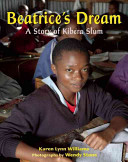
Beatrice is a thirteen-year-old orphan in Kibera, Nairobi – a Kenyan shantytown built on refuse and rubbish and one of the biggest slums in Africa. In this book she describes her life: her walk to school, the dust that blows between her teeth and the mud she wades through, her teacher’s down-to-earth encouragement, her fear of being alone, how safe she feels at school…This sensitive account in words and photographs reveals the realities of life for some of the world’s most deprived people – and offers hope as Beatrice follows her dream.
About Kibera slum: Kibera is in Nairobi, the capital city of Kenya, in east Africa. It is one of the largest slums in the world with over half a million people living there – about a quarter of the population of Nairobi. The slum covers 2.5 square kilometres (630 acres). There are no roads and few of the residents have modern toilets, clean drinking water or electricity. The crime rate is high and disease spreads rapidly in the unsanitary conditions. Many people come to Kibera from rural areas to look for jobs in the city. A large proportion of the children have become orphans because so many adults have died from AIDS – many people in Kibera are infected with the HIV/AIDS virus. A number of organizations work in the slum offering medical care, finding jobs and houses, and encouraging people to take part in sports and education. KIKOSHEP (Kibera Community Self-Help Program) provides care and advice for people with HIV/AIDS. They also have a youth center where youngsters like Beatrice can go for health information and advice. The center shows films and arranges sports and social events.
I first met Beatrice at the KIKOHEP primary school. Since then, she has graduated at the top of her class and is eligible to go on to secondary school. In Kibera, this is most children’s dream – they see education as the best way to escape from the slum. But sadly, many girls are sent away by their families into arranged marriages or end up on the street as prostitutes, so they are never able to realize their dream. The Kenyan Government and the United Nations have now started building new homes in Kibera so that they can move thousands of people out of the slum into better living conditions.

For a young girl, Beryl has big dreams- bigger than the vast ranch in British East Africa where she is being raised by her demanding father. Abandoned by her mother, who fled the remote African life to return to “civilized” England, Beryl’s only friend is her mother’s dog, Buller- that is, until one night when Buller is attacked by a leopard and dragged into the jungle. While keeping her promise to rescue him, she makes a new friend, and begins her journey to becoming one of the most famous and admired women of her time.
Based on the true life of Beryl Markham- the first pilot to fly solo from England to North America- Michaela MacColl’s richly imagined story of a feisty girl who hunts with Nandi warriors, becomes the best horse breaker on her father’s ranch, and resists all attempts to make her a proper lady, is a compelling and action-packed read for anyone with a thirst for adventure.
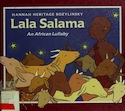
An African lullaby in Swahili and English in which a little boy says good night to all the animals and ends with his mother.
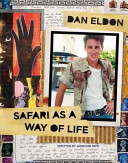
Photojournalist Dan Eldon left behind much more than the astonishing illustrated journals that would form The Journey is the Destination when he lost his life at age twenty-two while on assignment in Somalia. He also bequeathed a life story that has inspired students, teachers, artists, and creative activists—as well as a forthcoming film, an apparel line, and the Spring 2011 collection from Tom’s Shoes. Raised in Kenya, Dan grew up with a unique outlook on life. Through adventurous safaris and benevolent crusades around the world, he crafted a philosophy of curiosity, creativity, and charity. This unique visual biography showcases previously unpublished artwork from Dan’s acclaimed journals, letters, and snapshots that takes readers on a journey through Dan’s life and beyond, exploring the impact made by this remarkable artist on everyone who has encountered his story.